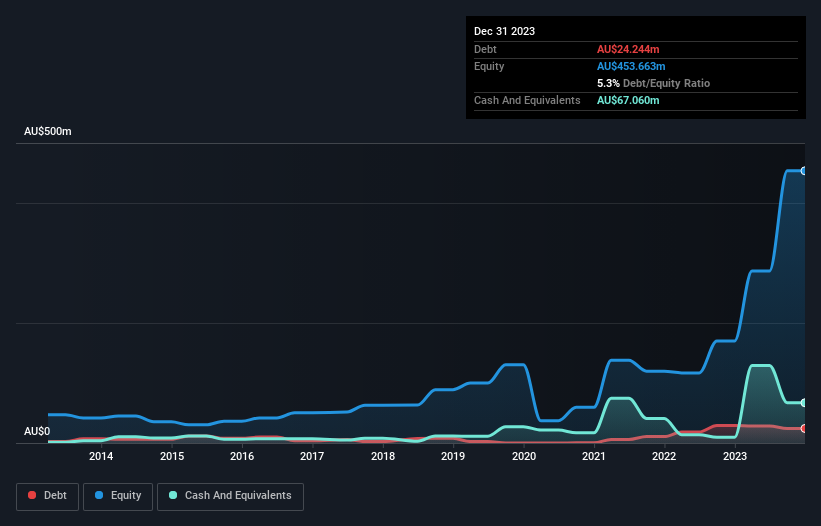The external fund manager backed by Berkshire Hathaway's Charlie Munger, Li Lu, makes no bones about it when he says 'The biggest investment risk is not the volatility of prices, but whether you will suffer a permanent loss of capital.' So it seems the smart money knows that debt - which is usually involved in bankruptcies - is a very important factor, when you assess how risky a company is. Importantly, Strike Energy Limited (ASX:STX) does carry debt. But is this debt a concern to shareholders?
When Is Debt A Problem?
Debt and other liabilities become risky for a business when it cannot easily fulfill those obligations, either with free cash flow or by raising capital at an attractive price. If things get really bad, the lenders can take control of the business. However, a more common (but still painful) scenario is that it has to raise new equity capital at a low price, thus permanently diluting shareholders. Of course, the upside of debt is that it often represents cheap capital, especially when it replaces dilution in a company with the ability to reinvest at high rates of return. The first step when considering a company's debt levels is to consider its cash and debt together.
Check out our latest analysis for Strike Energy
What Is Strike Energy's Debt?
The image below, which you can click on for greater detail, shows that Strike Energy had debt of AU$24.2m at the end of December 2023, a reduction from AU$29.1m over a year. However, its balance sheet shows it holds AU$67.1m in cash, so it actually has AU$42.8m net cash.

How Strong Is Strike Energy's Balance Sheet?
According to the last reported balance sheet, Strike Energy had liabilities of AU$37.2m due within 12 months, and liabilities of AU$35.2m due beyond 12 months. Offsetting this, it had AU$67.1m in cash and AU$11.7m in receivables that were due within 12 months. So it can boast AU$6.30m more liquid assets than total liabilities.
Having regard to Strike Energy's size, it seems that its liquid assets are well balanced with its total liabilities. So while it's hard to imagine that the AU$744.2m company is struggling for cash, we still think it's worth monitoring its balance sheet. Succinctly put, Strike Energy boasts net cash, so it's fair to say it does not have a heavy debt load! The balance sheet is clearly the area to focus on when you are analysing debt. But ultimately the future profitability of the business will decide if Strike Energy can strengthen its balance sheet over time. So if you're focused on the future you can check out this free report showing analyst profit forecasts.
In the last year Strike Energy managed to produce its first revenue as a listed company, but given the lack of profit, shareholders will no doubt be hoping to see some strong increases.
So How Risky Is Strike Energy?
While Strike Energy lost money on an earnings before interest and tax (EBIT) level, it actually booked a paper profit of AU$2.0m. So when you consider it has net cash, along with the statutory profit, the stock probably isn't as risky as it might seem, at least in the short term. With mediocre revenue growth in the last year, we're don't find the investment opportunity particularly compelling. There's no doubt that we learn most about debt from the balance sheet. However, not all investment risk resides within the balance sheet - far from it. For instance, we've identified 3 warning signs for Strike Energy (1 can't be ignored) you should be aware of.
If, after all that, you're more interested in a fast growing company with a rock-solid balance sheet, then check out our list of net cash growth stocks without delay.
New: Manage All Your Stock Portfolios in One Place
We've created the ultimate portfolio companion for stock investors, and it's free.
• Connect an unlimited number of Portfolios and see your total in one currency
• Be alerted to new Warning Signs or Risks via email or mobile
• Track the Fair Value of your stocks
Have feedback on this article? Concerned about the content? Get in touch with us directly. Alternatively, email editorial-team (at) simplywallst.com.
This article by Simply Wall St is general in nature. We provide commentary based on historical data and analyst forecasts only using an unbiased methodology and our articles are not intended to be financial advice. It does not constitute a recommendation to buy or sell any stock, and does not take account of your objectives, or your financial situation. We aim to bring you long-term focused analysis driven by fundamental data. Note that our analysis may not factor in the latest price-sensitive company announcements or qualitative material. Simply Wall St has no position in any stocks mentioned.
About ASX:STX
Strike Energy
An independent gas producer, explores for and develops oil and gas resources in Australia.
Good value with adequate balance sheet.
Similar Companies
Market Insights
Community Narratives




